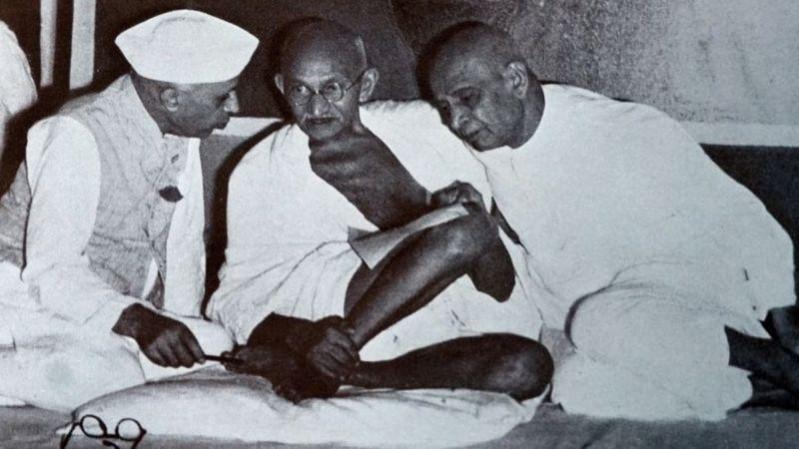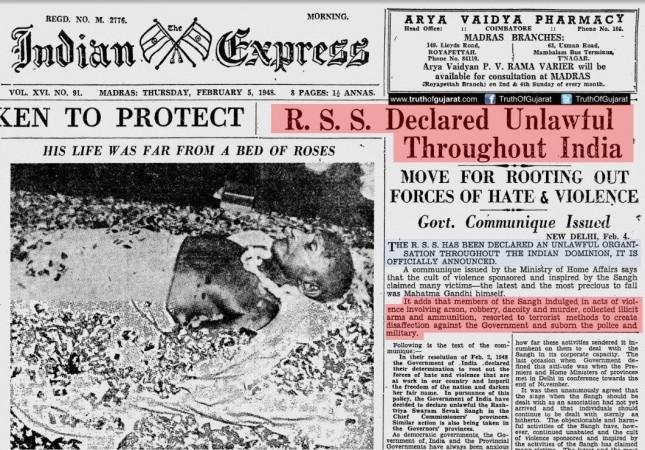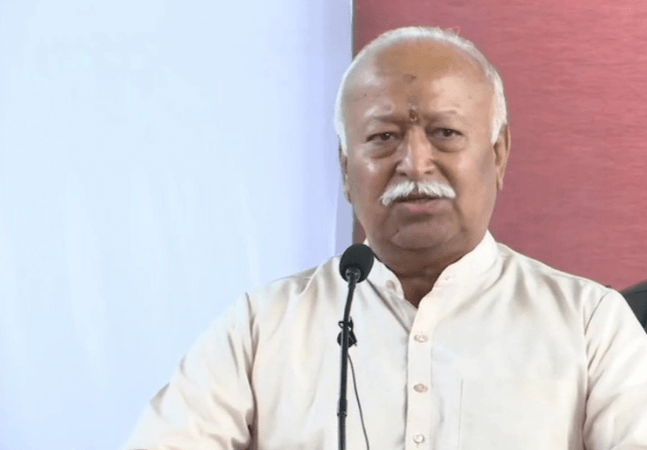As the Sangh Parivar including Bharatiya Janata Party (BJP) and the Narendra Modi government are trying to claim the legacy of India's first Home Minister Sardar Patel seems to have forgotten that RSS was banned by the 'Iron Man' as part of his efforts to "root out forces of hatred and violence".
The ban was imposed on February 4, 1948, exactly 73 years ago in wake of the murder of Mahatma Gandhi.
A communique by the Union Home Ministry had said that the cult of "violence sponsored and inspired by the Sangh claimed many victims -- the latest and the most precious to fall was Mahatma Gandhi himself".

RSS incited violence: Govt of India
The Union Home Ministry, led by Sardar Patel, had accused RSS of indulging in acts of violence involving arson, robbery, dacoity and murder, collected illicit arms and ammunition, resorted to terrorist methods to create disaffection against the government and suborn the police and military.
After the murder of Mahatma Gandhi, anger was growing against the RSS and Hindu Mahasabha, the organization with which Gandhi's killer Nathuram Godse was associated with. To cool down the anger and send a message that it was not associated with the killing, then sarsanghchalak (chief) of the RSS, MS Golwalkar issued instructions to all sakhas to observe condolence for a period of 13 days.
RSS' failed attempts
RSS prant sanghchalak (state chief) Lala Hansraj Gupta and the prant pracharak Vasantrao Oke were sent to Birla Bhawan to meet Congress leaders and express their grief and offer condolences. But the efforts to the Sangh did not elicit any positive response as Prime Minister Jawaharlal Nehru, in Amritsar declared, "RSS is responsible for the murder of the Father of the Nation."

The Government of India finally arrested then RSS chief Golwalkar and imposed a ban on the saffron organisation through a notification on February 4.
The above-cited communique, available in the Home Ministry archives, said that RSS members were exhorting people to resort to terrorist methods. Here is the full text of the communique:
In their resolution of February 2, 1948, the Government of India declared their determination to root out the forces of hate and violence that are at work in our country and imperil the freedom of the Nation and darken her fair name. In pursuance of this policy the Government of India have decided to declare unlawful the Rashtriya Swayamsevak Sangh in the Chief Commissioner's Provinces. Similar action is also being taken in the Governor's Provinces.
As democratic governments, the Government of India and the provincial governments have always been anxious to allow reasonable scope for genuine political, social and economic activities to all parties and organisations including those whose policies and purposes differ from, or even run counter to their own, subject to the consideration that such activities should not transgress certain commonly recognised limits of propriety or law. The professed aims and objects of the Rashtriya Swayamsevak Sangh are to promote the physical, intellectual and moral well–being of the Hindus and also to foster feelings of brotherhood, love and service amongst them. Government themselves are most anxious to improve the general material and intellectual well–being of all sections of the people and have got schemes on hand which are designed to carry out these objects, particularly the provision of physical training and education in military matters to the youth of the country. Government have, however, noticed with regret that in practice members of the Rashtriya Swayamsevak Sangh have not adhered to their professed ideals.
Undesirable and even dangerous activities have been carried on by members of the Sangh. It has been found that in several parts of the country individual members of Rashtriya Swayamsevak Sangh have indulged in acts of violence involving arson, robbery, dacoity, and murder and have collected illicit arms and ammunition. They have been found circulating leaflets exhorting people to resort to terrorist methods, to collect firearms, to create disaffection against the government and suborn the police and the military. These activities have been carried on under a cloak of secrecy, and the government have considered from time to time how far these activities rendered it incumbent on them to deal with the Sangh in its corporate capacity. The last occasion when the government defined this attitude was when the Premiers and the Home Ministers of provinces met in Delhi in conference towards the end of November.
It was then unanimously agreed that the stage when the Sangh should be dealt with as an association had not yet arrived and that individuals should continue to be dealt with sternly as hitherto. The objectionable and harmful activities of the Sangh have, however, continued unabated and the cult of violence sponsored and inspired by the activities of the Sangh has claimed many victims. The latest and the most precious to fall was Gandhiji himself.
In these circumstances, it is the bounden duty of the government to take effective measures to curb this reappearance of violence in a virulent form and as a first step to this end, they have decided to declare the Sangh as an unlawful association. Government have no doubt that in taking this measure they have the support of all law-abiding citizens, of all those who have the welfare of the country at heart.
RSS defied ban?
Despite the ban, the RSS however, continued its activities under the cloak of secrecy as a letter written in June 1948 to the then Hindu Mahasabha leader Shyama Prasad Mukherjee shows. The letter said that activities of the RSS "constituted a clear threat to the existence of Government and the State".
"Our reports show that those activities, despite the ban, have not died down. Indeed, as time has marched on, the RSS circles are becoming more defiant and are indulging in their subversive activities in an increasing measure," the letter reads.

SS rules present-day India
Skip to February 4, 2021, RSS still stands accused of inciting people, spreading communal hatred, creating a divide in the society but virtually rules the country and declare themselves true nationalists. The same RSS and its affiliates and their workers and supporters nowadays question the nationalism of those who have holds a different view.
Nonetheless, today the Union government which once banned RSS is governed by people having a strong affiliation with the RSS including Prime Minister Narendra Modi. BJP, an affiliate of RSS, is in power in over 12 states either with the full majority or in coalition with other parties.
RSS member Pragya Singh Thakur, accused in the Malegaon blasts, was elected as Member of Parliament from Bhopal. She is still undergoing trials in the terror case.















